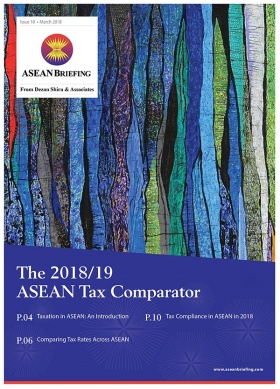Corporate Taxes in the Philippines
- All registered domestic and foreign companies in the Philippines are liable to pay corporate income tax.
- Starting in 2020, corporate income tax will be reduced from 30 percent to 20 percent over a 10-year period through the CITIRA initiative.
- Businesspeople should regularly familiarize themselves with regulations for tax residency, corporate income tax, withholding tax, and others to remain compliant.
In the Philippines, all companies – domestic or foreign – are liable to pay corporate income tax (CIT). The tax liability for a corporation is determined by its residency status and is based on the net income it obtains while carrying out its business activity, normally during one business year.
Beyond CIT, businesspeople should also understand withholding tax and some other taxes. Business leaders that regularly review corporate taxes in the country – and consult with their local advisors – find it easier to remain compliant and leverage any beneficial reforms, such as rate reductions or incentives.
Residency status of a company
A company is regarded as a resident if it is incorporated under the tax laws of the Philippines or as a foreign resident corporation that is duly licensed by the Philippine Securities and Exchange Commission (SEC) to engage in trade or business in the Philippines.
While a domestic company is taxed on its worldwide net taxable income, a foreign company – resident or non-resident -, is taxed only on income that is received in the Philippines, or that arises or is deemed to accrue in the country. Non-resident foreign corporations, however, are taxed on gross income derived from the Philippines.
Income tax does not include dividends received from domestic corporations; interest on Philippine currency bank deposit and yield or any other monetary benefit from deposit substitutes and from trust funds and similar arrangements; and other passive income previously subject to final taxes.Corporate income tax
The applicable CIT rate for both resident and non-resident corporations is 30 percent based on net taxable income. This is set to change with the introduction of the Corporate Income Tax and Incentives Rationalization Act (CITIRA) in September 2019. CITIRA will see CIT rates reduced to 20 percent in annual increments of 1 percentage point over a 10-year period starting in 2020.
Withholding tax
Dividends
Dividends distributed by a resident company are subject to withholding tax at 30 percent; those distributed to non-residents are taxed at 15 percent, provided the country of the non-resident recipient allows a tax credit of 15 percent. The withholding tax may be reduced under an applicable tax treaty.
Interest
Interest paid to a non-resident is subject to a 20 percent withholding tax unless otherwise stipulated under a tax treaty.
Royalty
Royalty payments made to a domestic or resident company are subject to a final withholding tax of 20 percent. A 30 percent withholding tax is levied on royalty payments to non-residents.
Other taxes imposed on corporations
Fringe Benefits Tax (FBT)
Fringe benefits granted to supervisory and managerial employees are subject to 35 percent tax on the grossed-up monetary value of the fringe benefit. Under new income tax regulations, fringe benefits mean any good, service or other benefit granted in cash or in kind, other than the basic compensation, by an employer to an individual employee.
The benefits include, but not limited to housing; expense accounts; vehicles; household personnel; interest on loans at less than market rate; club membership fees; expenses for foreign travel; holiday and vacation expenses; education assistance; and life or health insurance and other non-life insurance premiums.
Fringe benefits tax, however, is not imposed when the fringe benefits are deemed necessary to the nature of your business.
Branch Profit Remittance Tax (BPRT)
Branches of foreign companies in the Philippines, except those registered with the Philippine Economic Zone Authority, are subject to income tax at the rate of 30 percent on their income derived within the Philippines. A 15 percent branch profit remittance tax (BPRT) is levied on the after-tax profits remitted by a branch to its head office.
After-tax profits remitted by a branch do not include income items which are not effectively connected with the conduct of its trade or business in the Philippines. Such income items include interests, dividends, rents, royalties, including remuneration for technical services, salaries, wages, premiums, annuities, emoluments or other fixed or determinable annual, periodic or casual gains, profits, income and capital gains received during each taxable year from all sources within the Philippines.Minimum Corporate Income Tax (MCIT)
A minimum corporate income tax (MCIT) of 2 percent is imposed on the gross income of both domestic and resident foreign corporations, on an annual basis. It is imposed from the beginning of the fourth taxable year immediately following the commencement of the business operations of the corporation.
The MCIT is imposed when the standard 20 percent CIT is lower than the 2 percent MCIT on the company’s gross income. Any excess of the MCIT over the normal tax may be carried forward and credited against the normal tax for the three immediately succeeding taxable years
Improperly Accumulated Earnings Tax (IAET)
Income accumulated by closely-held corporations with a purpose of avoiding tax attracts an improperly accumulated earnings tax (IAET)of 10 percent. The closely held corporation may refer to companies wherein at least 50 percent of the capital stock or voting power is owned directly or indirectly by not more than 20 individuals.
The tax base of the 10 percent IAET is the taxable income of the current year plus income exempt from tax, income excluded from gross income, income subject to final tax, and the amount of net operating loss carry-over deducted.
Corporations excluded from the ambit of the IAET include banks and other nonbank financial intermediaries; insurance companies; publicly-held corporations; taxable partnerships; general professional partnerships; non-taxable joint ventures; and duly registered enterprises located within the special economic zones declared by law which enjoy payment of special tax rate on their registered operations or activities in lieu of other taxes, national or local.
The criteria to determine the liability for the IAET is the purpose of the accumulation of the income and not the consequences of the accumulation. That is, if a company allows its earnings or profits to accumulate within its reasonable needs, then it would not be subject to the tax unless proven to the contrary.
This article was originally published on May 18, 2018 and was updated on October 3, 2019.
About Us
ASEAN Briefing is produced by Dezan Shira & Associates. The firm assists foreign investors throughout Asia and maintains offices throughout ASEAN, including in Singapore, Hanoi, Ho Chi Minh City and Jakarta. Please contact us at asia@dezshira.com or visit our website at www.dezshira.com.
- Previous Article Tax Obligations of Non-Profit Organizations in Singapore
- Next Article New Tax Cuts, Incentives in the Philippines under CITIRA







